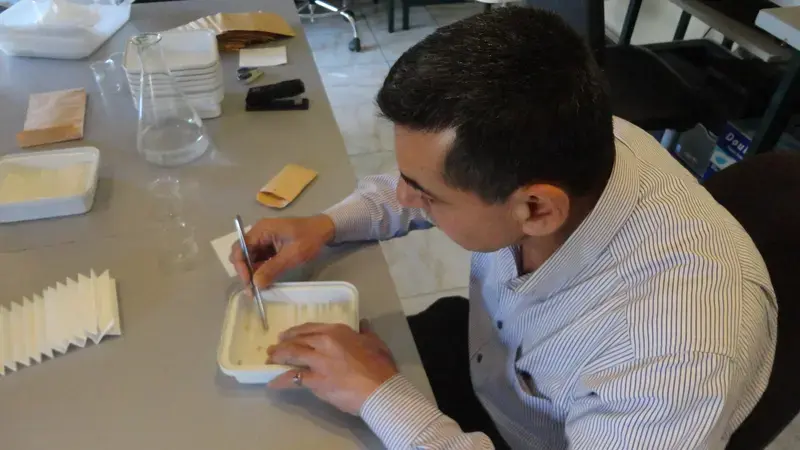Press Release: ICARDA safeguards world heritage of genetic resources during the conflict in Syria

AMMAN, Jordan: The International Center for Agricultural Research in Dry Areas (ICARDA) has requested in September 2015 to be provided with part of its genetic materials that has been duplicated in the Svalbard Seed Vault in Norway. ICARDA needs some of the materials back from Svalbard to answer requests for germplasm coming from agricultural organizations and farmers around the world.
ICARDA plays a crucial role in conserving and distributing of genetic resources of cereals, food and feed legumes and pastoral species. Its GeneBank in Syria holds "in-trust" around 150, 000 accessions in the active collection. The GeneBank distributes up to 25,000 samples yearly to collaborators and requestors around the world, particularly national programs in developing countries, which requires continuous efforts of multiplication to replenish the stocks.
The security situation in Syria has significantly affected genetic resources activities, mainly field related activities, as storage facilities of its GeneBank are still operational in spite of all the difficulties. Therefore, ICARDA has secured 100% of its germplasm collection stored in Aleppo, Syria, via duplications and safe storage outside of the country.
In 2014, ICARDA had duplicated more than 80 percent of its globally unique collection of the plant genetic resources, a total of 116,484 accessions of germplasm of most important crops, and shipped to Norway. Sets also have been duplicated in several genebanks including the CGIAR Research Centers CIMMYT and ICRISAT, the United States Department of Agriculture (USDA), and safe places in Germany, Turkey, Lebanon and Morocco. ICARDA highly appreciates the support received in this regards from Norway, USA, Germany, Turkey, Lebanon, Morocco and its sister Centers.
“Until recently we were using and dispatching bulk seeds of these genetic materials to meet requests from Aleppo in spite of the tough security situation.” said ICARDA Director General, Dr. Mahmoud Solh.
“ICARDA requested some of its stored material in Svalbard in order to reconstitute the active collection in both Morocco and Lebanon in large bulks to meet requests for germplasm from the collections we have to meet the challenges facing dry areas globally,” adds Dr. Solh. “Once we multiply these varieties, ICARDA will return part of it to Svalbard as another duplicated set.”
ICARDA’s GeneBank is used to provide breeders, scientists and farmers with genetic materials of favorable traits to improve crop growth and yields in the face of changing climates in a manner that meets international scientific standards and which is cost efficient, secure, and reliable.Out of this germplasm national partners released more that 920 varieties of wheat, barley, lentil, Kabuli chickpea, faba bean, peas, grass pea and forage crops that are tolerate to abiotic stresses (e.g. drought, heat, cold, salinity) and biotic stresses (diseases, insect pests and parasitic weeds) to contribute to food security and improve livelihoods in dry areas.
Entrusted with the genetic wealth of 128 countries, safeguarding genetic materials is a critical mission for ICARDA. The common challenge is to produce more nutritious food on less land in an increasingly unpredictable climate. A greater diversity of genetic plant resources, stored in genebanks and available to all through an efficient conservation system can guarantee to secure the future food supply at stable and affordable prices.
The GeneBank at Aleppo has been home to a globally important collection of landraces and wild relatives of cereals and legumes – many of them rare – collected through hundreds of collection missions over the past four decades.
Dr. Solh confirms, “All of ICARDA’s germplasm collections are saved outside Syria.”
ICARDA is working closely with the Crop Trust, an international organization working “to safeguard crop diversity, forever. Whether mitigating the causes of climate change or preparing for its impacts, the world’s crop diversity represents a heritage of human ingenuity that helps counter the man-made threat of our age.” says Dr. Ahmed Amri, Head of Genetic Resources at ICARDA.
“It is an urgent need to safeguard the building blocks for sustaining agricultural development and food security. The CGIAR genebanks are essential for food security, their mission it is not controversial, we know how to do it, and it is doable for only $34 million a year,” he adds.
ICARDA is working in close consultation with CGIAR, the Global Crop Diversity Trust (GCDT), Germany (GIZ), the Arab Fund for Economic and Social Development (AFESD) and other donors to protect its valuable genetic resources. ICARDA aims to leverage additional funds for the rehabilitation of genebanks in Lebanon and Morocco and reconstruction of the active germplasm collection, which are of great value to mankind. The GCDT is working towards the development of an endowment fund to support all CGIAR genebanks, which will require 500 million dollars.
###
The International Center for Agricultural Research in the Dry Areas (ICARDA), a member of the CGIAR Consortium, is the global agricultural research organization working with countries in the world’s dry and marginal areas to deliver sustainable systems solutions that increase productivity, improve rural nutrition, and strengthen national food security.
For more information, please contact Andrea Gros, Head of Communication and Documentation Services at [email protected]
